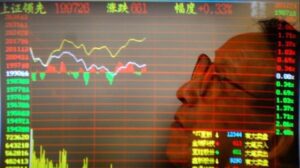
Stock indices of most major countries in the Asia-Pacific region (APR) are declining ahead of meetings of the world’s major central banks.
Traders evaluated the statistical data from China and Japan.
China’s Shanghai Composite index was down 0.35% by 7:41 a.m.
China’s Purchasing Managers’ Index (PMI) for the manufacturing sector rose to 50.1 points in January from 47 points a month earlier, data from China’s State Bureau of Statistics (SBS) showed. Experts on average expected it to rise to 49.8 points, Trading Economics noted.
The PMI above the 50-point mark indicates an increase in activity in the industrial sector. The value of the index exceeded this level for the first time since September against the background of the lifting of anti-commodity restrictions.
Combined profits of major Chinese industrial enterprises fell 4 percent year on year to 8.4 trillion yuan ($1.24 trillion) in 2022, according to the country’s State Statistics Bureau (SBS).
At the same time, the rate of decline accelerated compared to January-November, when the decline was 3.6%.
Meanwhile, Hong Kong’s Hang Seng indicator collapsed by 1.5%.
Sunny Optical Technology Group Co. Ltd. (-5.6%), Hang Lung Properties Ltd. (-5.3%) and Wharf Real Estate Investment Co. Ltd. (-4.2%).
Japan’s Nikkei 225 index was down 0.2% by 7:39 a.m.
Japan’s retail sales rose for the tenth month in a row in December 2022, the rate of increase accelerated and was better than analysts’ expectations.
Sales rose 3.8% from December 2021, the Ministry of Economy, Trade and Industry said. They were up 2.5% in November.
Experts polled by Trading Economics predicted a 3% increase on average.
Shares of Nippon Light Metal Holdings Co. Ltd. (-6.8%), Daiichi Sankyo Co. Ltd. (-4.5%) and Resona Holdings Inc. (-2.8%).
The value of South Korea’s Kospi dropped 0.9%.
Shares of one of the world’s largest chip and electronics maker Samsung Electronics Co. fell 3.3%. The company cut its operating profit by 69% in the fourth quarter compared with a year earlier amid a sharp drop in demand in its memory chip and smartphone divisions.
Shares of automaker Hyundai Motor fell 1.5%.
Australia’s S&P/ASX 200 index lost about 0.1% on the day.
The capitalization of the world’s largest mining companies BHP and Rio Tinto increased by 0.3% and 0.9% respectively.
At the same time the securities of Pilbara Minerals Ltd. fell by 5%.
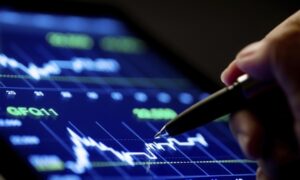
Stock indices of the largest Asia-Pacific countries are mainly gaining on Friday following the U.S. stock market dynamics.
The stock exchanges in Mainland China continue to remain closed on the Spring Festival (the beginning of the new year according to the lunar calendar).
The growth of optimism in Asian markets was also supported by the U.S. statistics published the day before, which showed that the economy remains flexible, despite a significant tightening of monetary policy by the Federal Reserve (FRS).
According to preliminary data from the U.S. Commerce Department, the country’s GDP rose 2.9% year-over-year in the fourth quarter after climbing 3.2% in the previous quarter. The consensus forecast by analysts, cited by Trading Economics, suggested economic growth had weakened to 2.6%.
The Nikkei 225 Index was up 0.05% by 7:09 a.m.
The leaders of the price growth are the securities of the chemical company Shin-Etsu Chemical Co. Ltd. (+4.2%), industrial robotics manufacturer Yaskawa Electric Corp. (+3.7%) and Chiba Bank Ltd. (+3.6%).
Shares of carmaker Toyota Motor rose 0.4% and consumer electronics maker Sony gained 1%.
Hong Kong’s Hang Seng index was down 0.01% by 7:16 a.m.
Shares of solar panel maker Xinyi Solar Holdings Ltd. (-3.5%), computer maker Lenovo Group Ltd. (-3%) and home appliances and electronics maker Haier Smart Home Co. Ltd. (-2.3%).
Shares of retailer Alibaba Group Holding Ltd. fell 1.3% while JD.com Inc. rose 1.8%.
South Korea’s Kospi was up 0.7% by 7:14 a.m.
The stock price of one of the world’s largest chip and electronics maker Samsung Electronics Co. is up 1.1%, the share price of automaker Hyundai Motor is down 0.6%.
Australia’s S&P/ASX 200 index added 0.3% for the day.
Australia’s producer price index rose 0.7% quarter-over-quarter in the fourth quarter of 2022, compared with a 1.9% increase in the third quarter. The index was up for the tenth consecutive quarter, but the rate of increase was the slowest since the second quarter of 2021, Trading Economics wrote.
BHP and Rio Tinto, the world’s largest mining companies, rose 0.6% and 0.4%, respectively.
Fortescue Metals Group Ltd. shares gained 0.04%. The company said it shipped a record volume of iron ore in the fourth quarter while cutting production costs compared with the previous three months.
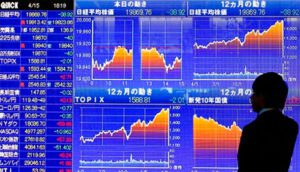
Stock indices of Asia-Pacific countries are changing differently on Wednesday morning because the dynamics of Wall Street the day before was also mixed and did not give direction to the Asian market.
At that trading activity remains below usual level as Chinese and Hong Kong stock exchanges are closed in connection with the celebration of the New Year according to the lunar calendar, MarketWatch notes.
Investors are assessing the statements of major companies over the past quarter and the statistical data from Australia.
As it became known on Wednesday, consumer prices in Australia rose by 8.4% year-over-year in December after climbing by 7.3% in November and well ahead of the forecast of 7.6%.
This sharp acceleration in inflation is largely due to higher real estate prices (new buildings jumped 16%) and motor fuel (10.8% after increasing by 8.4% in November), as well as recreation and cultural events (+14.4% vs. 5.8%).
Inflation was 7.8% in the fourth quarter, up from 7.3% the quarter before, a record high since 1990.
The jump in inflation raises the likelihood of another key interest rate hike by another 25 basis points by the Australian Central Bank in February, IG market analyst Yip June Rong said.
Australia’s S&P/ASX 200 index is down 0.15%.
Australia’s banking sector is mostly up on the prospect of higher interest rates, with Commonwealth Bank shares up 0.8%, ANZ Group up 0.1% and Macquarie Group up 0.7%.
Meanwhile, leading mining companies BHP Group and Fortescue Metals are down 0.8% and 0.4%, respectively, while Rio Tinto is down 0.6%.
The value of Japanese index Nikkei 225 increased by 0.5%.
Shares of Suzuki Motor Corp. (5.7%), Nippon Steel (4.5%) and Tokyo Electric Power Co. (3.3%) act as growth leaders among index components.
Nidec Corp.’s capitalization fell 5.7% after the electric motor maker sharply cut its full-year operating profit forecast due to shrinking demand and a slow recovery in the global auto industry.
South Korea’s Kospi Index jumped 1.3%.
The market value of Samsung Electronics Co. one of the world’s biggest chip makers rose 2.6 percent and automaker Hyundai Motor rose 0.7 percent.
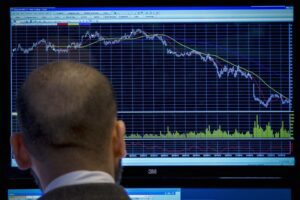
Stock indices of most major Asia-Pacific countries are rising on Friday, the exception is the Japanese market.
Japan’s Nikkei 225 index was down 1.2% by 7:32 am KC.
One of the reasons was the 7.4% drop of Fast Retailing stocks. A day earlier Asia’s largest apparel retailer, which owns the Uniqlo brand, released its September-November reporting, which failed to meet analysts’ expectations.
Fast Retailing increased its revenue in the first quarter by 14%, but it was below the forecasts. At the same time, net income fell 9 percent, mainly due to weak performance in China, where strict quarantine restrictions were in effect.
In addition, shares of automakers Mitsubishi Motors Corp. (-4.3%), Mazda Motor Corp. (-4.2%) and Subaru Corp. (-2.6%) became cheaper on Friday.
Meanwhile, financial sector stocks including Mitsubishi UFJ Financial Group Inc. (+3.5%), Chiba Bank Ltd. (+5.2%), Concordia Financial Group (+6.4%), Fukuoka Financial Group Inc. (+6.4%) rose.
China’s Shanghai Composite was up 0.5 percent by 7:37 a.m. ET, Hong Kong’s Hang Seng gained 0.1 percent.
Shares of game developer Netease Inc. surged 2.9 percent on Hong Kong Stock Exchange, oil producers PetroChina Co. and CNOOC gained 2.9 percent and 1.9 percent, respectively, while Chow Tai Fook Jewellery Group gained 3.1 percent and retailer Alibaba rose 0.6 percent.
China’s foreign trade surplus in 2022 increased by 29.7% to a record $877.6 billion, China’s General Administration of Customs reported on Friday. At the same time, exports increased by 7% and imports increased by 1.1%. The growth rates were lower than in 2021, when they were 29.9% and 30.1%, respectively.
Meanwhile, China’s exports fell 9.9% in December and imports fell 7.5%. The decline in both indicators was recorded for the third month in a row.
The value of South Korea’s Kospi was up 0.85% by 7:32 a.m. ET. The index has been rising for the eighth consecutive trading session and is at its highest level in the past month.
Stocks of one of the world’s biggest chip and electronics makers Samsung Electronics Co. rose 0.7%, automaker Hyundai Motor rose 1.5% and steelmaker Posco gained 4.6%.
Australian S&P/ASX 200 index added 0.7% over the day.
Shares of the world’s largest mining companies BHP and Rio Tinto gained 0.5% and 0.9% respectively.
The value of the country’s leading wine producer Treasury Wine Estates Ltd. rose 2.1%.
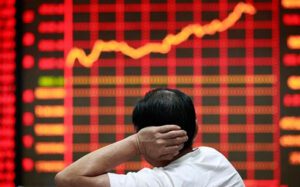
Asia-Pacific (APAC) stock indexes are mostly rising in trading on Friday, except for Hong Kong indicator, following the dynamics of the U.S. stock market.
Japan’s Nikkei 225 stock index was up 0.6 percent by 7:06 a.m. Ksk.
Shares of electronic components producer Taiyo Yuden Co. Ltd. (+4.75%), transport and logistics Kawasaki Kisen Kaisha Ltd. (+4.2%) and Sumitomo Metal Mining Co. Ltd. (+3.7%).
Shares of Mazda Motor Corp. (+3.1%), Tokyo Electron Ltd. (+2.7%) and Sony Group (+2.6%) are also up.
China’s Shanghai Composite stock index was adding 0.1 percent by 7:18 a.m. Ksk.
The Hang Seng index is losing 0.13%. The Hong Kong indicator rose earlier in trading amid reports that China will reopen border crossings with Hong Kong starting Sunday. Border posts have been closed for three years.
The People’s Bank of China (PBOC) on Friday lent 2 billion yuan to banks in seven-day reverse repo transactions at an annual rate of 2 percent. At the same time, similar loans worth 386 billion yuan matured on the same day. As a result, the net outflow of funds from the market amounted to 384 billion yuan, writes Trading Economics.
Leaders of the fall in Hong Kong are securities of casino operator Galaxy Entertainment Group Ltd (-4.4%), Alibaba Health Information Technology Ltd (-4.1%) which provides IT services in medical sphere and sports equipment manufacturer Anta Sports Products Ltd (-3.2%).
South Korea’s KOSPI was strengthening 1.3 percent by 7:18 a.m. Ksk.
One of the world’s biggest chip and electronics maker Samsung Electronics Co. is up 1.4%, carmaker Kia Corp. is up 0.8%.
Australia’s S&P/ASX 200 index rose 0.65%.
The capitalization of the world’s largest mining companies BHP and Rio Tinto rose 3.2% and 2.4%, respectively.
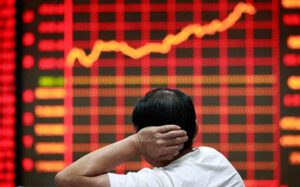
Stock indices of the largest Asia-Pacific countries do not show the same dynamics during the trading on Monday.
The positive factor for the Chinese stock market is the news about the gradual lifting of anti-hygienic restrictions in the country, writes Trading Economics.
Meanwhile, China’s service sector business activity index fell to 46.7 points in November from 48.4 points a month earlier, the purchasing managers index (PMI) calculated by Caixin Media and S&P Global showed. Thus, it declined for the third month in a row.
The PMI value above the 50-point mark indicates growth of activity in the sector, while below it indicates its weakening. Analysts on average expected a less significant drop in the index to 47 points, according to Trading Economics.
China’s Shanghai Composite index was up 1.5 percent by 7:27 a.m. and had surpassed the 3,200-point mark for the first time in more than two months. Hong Kong Hang Seng indicator jumped 3.2%.
The shares of Alibaba Health Information Technology Ltd., which provides IT services in medical sphere, showed the most significant increase of 18.3% on the Hong Kong Stock Exchange.
In addition, developer Sands China (SPB: 1928) and Longfor Group gained 14% and 8.8%, respectively, while restaurant chain owner Haidilao International Holding Ltd. – by 10.9%, consumer electronics maker Xiaomi (SPB: 1810) by 8.1% and Internet company Baidu by 7.9%.
Retailers Alibaba (SPB: BABA) and JD.com Inc. (SPB: JD) were up 5.2% and 7.5%, respectively, telecoms China Unicom and China Telecom (SPB: 728) up 6.4% and 4.5%.
In Shanghai, airlines including Air China (+1.9%), China Eastern Airlines (SPB: 670) (+4%) and China Southern Airlines (SPB: 1055) (+3.2%), alcohol producer Kweichow Moutai (+1.9%) and China Tourism Group Duty Free Corp. (+2.2%) are rising their share prices.
The value of Japan’s Nikkei 225 is around the level of Friday’s closing trading.
The top gainers among the index components are shares of pharmaceutical Eisai (+4.7%), cosmetics company Shiseido (+2.9%) and clothing retailer Fast Retailing (+2.8%).
Meanwhile, car makers Nissan Motor (-2.8%) and Isuzu Motors (-2.5%), optics makers Olympus Corp. (-3.4%) and Nikon Corp. (-2.7%) were falling in price.
South Korea’s Kospi Index was down 0.8% by 8:15 a.m. Moscow timeframe.
The stock quotes of one of the world’s largest chip and electronics maker Samsung Electronics Co. plunged 0.3%, automaker Hyundai Motor – 2.7%.
Australian S&P/ASX 200 index added 0.5%.
Share prices of the world’s largest mining companies BHP and Rio Tinto jumped by 2.7% and 3.9%, respectively.
At the same time the price of securities of Elders Ltd. providing services in the agricultural industry fell by 4.2% after UBS analysts worsened recommendations for them to “neutral level” from “buy”.